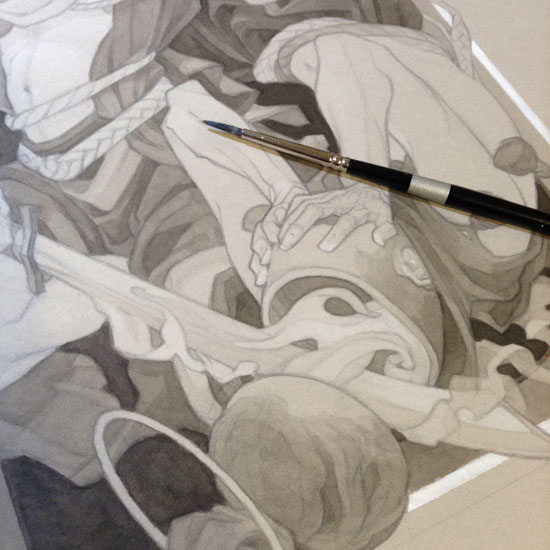Teaching a man to fish is overrated.
A long time ago, I set out to build myself a portfolio website. I lacked even the most basic skills to accomplish the task, but luckily I was friends with a talented web designer, and he agreed to teach me to code. He never seemed to get around to it, though; after many long months of waiting, I ended up googling “how to build an html website.” I clicked the links, followed the tutorials, and before too long, I had a functioning website, with all the garish colors and font choices one might expect of a fledgeling web designer.
But making changes to the website was a time-consuming process, and some things I wanted to accomplish (rounded corners! drop shadows!) were still beyond the scope my knowledge. I went to my web designer friend again; he mentioned CSS (a language that allows sweeping design changes to be made to an entire website with a few keystrokes, and unlocks a whole world of nifty design hacks). Again, he agreed to help me.
As summer turned to fall and the promised assistance failed to materialize, I grew impatient and googled “how to add css to an html website.” A few tutorials later, my website had rollover effects, drop shadows, and rounded corners; but I’d discovered the limitations of this language as well. It seemed that integrating PHP was the logical next step; luckily, my friend was an expert. Would he teach me how? “Yes,” he said, and off to Google I went, having finally gained the insight my wise and lazy teacher had been trying to impart all along.
The King of Spades: Introspection. From my illustrated playing card deck, Reign of Sin.
If you teach a man to fish, he’ll be eating fish for a lifetime. Teach him to teach himself to fish, and you’ve given him the fundamental life skill of figuring things out on his own. Now, a whole world of skills are within his reach — even the ones you, his teacher, lack (cooking, canning, marketing…) Now, instead of eating raw trout on a riverbank for the rest of his life, your former student is building his own canned fish company from the ground up! He’s going to be eating steak.
As a playing card illustrator, I get a lot of emails from aspiring deck designers. “Where did you get your card decks printed?” they usually ask first. I tell them that while there are many companies that will print card decks, only a few of them offer the exact specifications and quality that a serious playing card collector will deem worthwhile. I tell the would-be designer to do some research on playing card forums, where the matter is discussed in greater detail.
“OK, but which company did you use?” they ask. I used the best one, I tell them.
“So you’re not going to help me?” they ask. Yes, I answer. Seated in my perfect lotus position, I levitate only slightly.
And now, I’m going to help you too! I’m using the playing card inquiry as an example, but the steps below are a good way to tackle almost any problem you feel out of your depth on.
1) Identify a teacher.
Choose someone as a role model. No need to pick your #1 favorite artist or the future father/mother of your children – just someone who’s succeeded at the thing you’re trying to do, preferably someone with a strong online presence so that you you can retrace their footsteps and dig through their garbage bins a little. This is the person you’d like to pepper with questions… but! You’re not going to.
2) Write down all the questions you’d like to ask this person.
Start with your top-level newbie questions BUT (and this is important) add a “why” after them. (“Where did you get your decks printed…and why?“). That little “why” means you’re not just looking for a checklist to follow – you’re seeking to actually understand something about the nature of the problem.
3) Identify the “true” questions.
Now, dissect the “why” of your original question. Why would someone choose one printer over another? Because one of them is better, obviously. Your question is now a little more specific: “which printer is better?” Don’t stop here. Go one layer deeper and ask yourself the question: “what does ‘better’ mean in this context?” From the standpoint of our aspiring Kickstarter profiteer, the “better” choice is probably the one that will allow them to sell their deck to a larger number of card collectors at a higher price. So — what does “better” mean to that target audience, the collectors themselves?
4) Try to answer those “true” questions on your own.
The internet is a big place that contains almost every answer. If you want to know what inspires playing card collectors to get out their wallets, google “playing card forum” and start clicking around – you’ll quickly find collectors fawning over the decks they love, heaping scorn on the ones they hate, and justifying each reaction with the kind of detail that professional focus-group testers could only dream of. Dig a little deeper, and you’ll find threads weighing the pros and cons of various types of card stock, different styles of tuck cases, and yes… which printers can produce the kinds of deck the collectors consider worthy of collecting.
5) Seriously, ON YOUR OWN!
Inevitably, you’ll encounter a question that requires some tidbit of knowledge you don’t have yet, and your knee-jerk reaction will be to run to your teacher for help. Try to resist this urge (they probably won’t answer your email anyways!) Take another look at the question that’s stumping you, and go a layer deeper.
If your question is one that you couldn’t possibly puzzle out yourself and can’t find the answer to on Google (“How much does it cost to print 1000 card decks? How did you promote your Kickstarter?”), rather than asking your teacher, ask yourself how they would have figured it out.
That elusive pricing question? You’ll realize that your role model probably reached out to manufacturers for quotes – and that your own next step is going to be firing off a few inquiries to customer service.
The Kickstarter promotion? Try searching for their name in those playing card forums, or scrolling back through their social media posts from the time they launched the project, noting how frequently they posted and how far in advance of that launch (weeks? months? years?) they were sharing content.
If you go deep enough into this process — distilling your broad, checklist-style questions into “true” questions that get to the meat of the problem, and putting yourself in your teacher’s shoes to ferret out the answers for yourself — you may very well hit bedrock, discovering that there were never any questions that you really needed your “teacher” to answer for you at all. You may find that there was never a gatekeeper to the knowledge you sought, only a threshold you were uncertain about crossing alone.
This is the moment that you realize you’ve taught yourself how to teach yourself to fish.









How painfully true!
Hmmm in regards to the article the wisdom of the lazy teacher. I see what the writer is maybe trying to say which is the more you or a student thinks, identifies and researches a question the better they will be in the long term because the will have gained the knowledge and possibly the answer from their own research. Rather than just mimicking or parroting what their teacher said. Still I have to disagree with the article’s over all theses, students should ask teachers questions (even stupid questions) because that is how we learn. It’s fine to say google it or go to the library and do your own research BUT the purpose of teachers is to help students learn faster and more effectively. A basketball coach teaches skills and theory to the players rather than have them figure it out on their own. Why because he wants the players to be skilled and good faster so they and his team can win. In essence that is what teachers are there for to teach students effectively so the student can have a head start and not suffer as many pitfalls as the teacher did. Again I see the article’s point and the positive point it’s trying to make but over all I believe that mindset is flawed no teacher should ever say
‘Figure it out yourself”. We all need teachers to give us insight and wisdom from the experience they have that way we can all level up faster and not make all the same mistakes.
Tom – a fair point, but I don’t think the author is anti-teacher. I interpret this article instead as encouragement to adopt a mindset of curiosity and inquiry, and to default to a willingness to do the work, instead of to assume you don’t know/ can’t figure it out and need help. Imagine the POOWWWER of a question and an answer after the student has gained an appreciation for the real “why” of the question, and not just the “what.”
To each their own, for sure, but in the same way that a teacher can blow a student’s mind with insight, a person can gain a lot of agency in their own learning and journey I reckon by diving in and learning to answer their own questions. Both seem valuable to me.
Cheers!
Perhaps a better title would have been “The pitfall of the lazy student,” since this article is really directed towards the students, not for the teachers (who yes, should definitely be doing their jobs!) However while there’s no harm in asking or answering “stupid questions”, I’ll definitely stand by my assertion that teachers should push back on “lazy questions” — the ones that the student is CAPABLE of answering themselves, but hasn’t done the legwork on.
For a student in any field to succeed, they have to care whether they learn the skills at hand as much as their teacher does… preferably more. The critical thinking skills I’m advocating here will not only “help you help yourself,” but even more importantly, they will innoculate you against the damage that an unskilled or deliberately deceptive teacher can do when a student trusts them implicitly (cult leaders, multilevel marketing gurus, and the sex ed teacher who assures you that abstinence is the only way to prevent pregnancy are a few of the obvious examples that spring to mind).
I think if we were more willing to let “lazy” students of any particular field (the ones who aren’t willing to dig into their own questions, who don’t WANT to pull free of the hand they’ve been holding) sort themselves out early, we’d be freeing them up to focus their energies on a career or hobby they’re truly passionate about – and the world would have fewer failed artists and businessmen, and more successful snowboarders, chefs, and parents.
I think you are taking “teacher” and “student” too literally. Ms. Beckert is referring to would-be-freelancers loosely here and most of those are not “students” in a middle or high school setting but people out and about the wide open world. Even as a high school teacher I have to set answer limits otherwise students won’t learn to investigate and discover for themselves. “No, I am not going to show you how to attach a document. Why? Because that is a simple step by step process you can find online by literally asking the YouTube community. Try that first.” Also this concept of self suffeciency means that the “student” is committing to the path by committing THEIR time to discovery and not USING the “teacher’s” time that may or may not be taken for granted.
I love this. So many times I’ve taught myself something important, it’s because I wrote up an email to a “teacher”-type person with question bullets, and then afraid to waste their time, I reassessed whether or not I could find the answers to some on my own. Sometimes it meant reconsidering what I ACTUALLY wanted to ask, and whether or not it could even be answered by someone else. And almost always, I’d end up not sending the email at all. I always did it out of fear, and I love how this articulates it and reframes it as a struggle to be embraced.
This is awesome! I’ve definitely gone through the “wait, what am I trying to ask?” process myself… it feels like a way of respecting the time of the person I’m about to bother, and almost always does me more good in the long run than reaching out for an easy answer would have.
I can’t speak for anyone else, but if I got an email where someone said “I’ve looked in all these places, and tried all these things, and still can’t find the answer to my question” I’d be worlds more inclined to take notice and reply to it even on a busy day.
Interesting read! I think the “why of the why” is something that I definitely lack to do.
A wonderful essay, thank you. The thing is….you are not a teacher, or rather that is not your profession. You are an amazing artist, a professional artist. That is your job. Many young artists seem to think they are entitled to your wisdom. It’s easier to ask you than to figure it out themselves and cheaper than SmArt School. I have been guilty of that in the past but have learned that it’s best to learn by doing. With that said, I do so love all of your process videos and step by step information about your process LOL! It is very generous of you….. but not your job. Thank you again for all of it. You really are my favorite artist. sigh.
Thank you! And there are definitely separate circles on the venn diagram for “teacher” and “expert” with only a little bit of overlap in most fields… making it all the more confusing for students. Experts can make good teachers, but only if you have the right questions to ask them (and, ideally their consent, haha).
I love this! So much in this article. Thank you Wylie!!
I love this. It should be required reading for anyone who automatically tries to rent someone’ else’s brain as the first step in learning something. You are not really saying, “figure it all out yourself.” You are saying, “don’t expect someone to do the heavy lifting for you.” That kind of learning doesn’t stick anyway. A good teacher helps the student find the answer. And a good teacher always learns from the student in the process.
Learning to learn is hugely useful, yes. That’s how I learned most things, as I was homeschooled from middle school on and was trying to learn a lot of things my parents couldn’t teach me. And trying to figure stuff out on your own can definitely be one of the most effective ways to learn.
I would argue, though, that discussing things among your peers IS part of research. That’s what networks and forums and other social platforms are FOR: discussing things, asking questions, comparing notes, etc. And before internet, talking to people was the primary way to find things out – and is still a good tool for learning.
Learning to talk to people and ask pertinent questions is, I think, part of learning to learn. It helps to do your own research first, so you know WHAT to ask and who to ask, rather than running to a mentor first thing. But asking can be a tremendously useful part of the research – and learning – process.
And peer discussion is invaluable when it comes to comparing notes about companies and services, and finding out which ones are reliable versus which ones are scams or just plain crappy. Anonymous online reviews can be useful to a point, if you can figure out which reviews are bogus, and if any reviews exist for the company you want to research, but reviews from someone whose opinion you can trust are even better.
“Just Google It” is okay as far as it goes, but can lead down an endless rabbit hole of terrible misinformation – discussion with actual people can help steer one away from the worst pits of misinformation and lead to solutions faster.
(Sometimes I’ve spent literal days trying to resolve a tech issue with a website and gotten nowhere on Google, only to finally contact tech support on my hosting service and get an answer within an hour. Which, if I’d contacted them in the first place, would have given me that many more days to actually make art. So there’s that.)
All of this! I don’t want to see other artists make bad or expensive mistakes, if I can help give advice.
Excellent article! Thanks for sharing the insight.
Yes! So much this! I think you’ve got it spot on, with a teacher leaving breadcrumbs for the student to research and follow. I’m always amazed when someone, or sometimes it’s me, is showing a step-by-step process and people aren’t taking notes. If it’s me, I know they will be back the next week asking the same question about how to do the thing. It also takes time and effort to find out how you yourself learn best. Thank you for putting it so clearly.
So, there’s a difference between encouraging self sufficiency and gatekeeping information. While it’s true that learning how to research is valuable, for things like which company you used for printing, just tell your fellow illustrators. Most illustrators live on a razor thin margins, and juggling real life (kids, bills, jobs etc.) while trying to research every little aspect of the industry can be a burden that many people simply can’t overcome. This article might be directed more at young illustrators, or people with the luxury of time, but gatekeeping information is one of the biggest issues in our industry. If we all shared our tips and tricks (and rates and contracts and contacts and yeah, printing companies) more illustrators would be spared the heartbreak of failure when the walls put up around success in the industry simply become to steep to climb.
For me, the fact that illustration is such a tough field to succeed in makes this principle all the more important; there’s so much more to the process than using the right paper and checking the right boxes. It really does require a lot of critical thought, a lot of careful planning, and a lot of very personalized decisions to make it work as a business — and no one, no matter how helpful they are, can save you from having to put in that hard work.
It’s like someone getting ready to hike the Appalachian Trail asking someone else to tie their shoes for them. I’d argue that it’s more “helpful” to tell them, “This is a long, hard road; if you can’t handle the burden of putting your shoes on by yourself, you aren’t going to make it,” than to tie their shoes and send them off into the deep dark woods.
With that said, I definitely don’t go in for obfuscating information… you can find the words “printed by the USPCC” in 24pt type at the very top of my deck’s Kickstarter page, which is why I give such serious side-eye when that’s the opening question someone who’s allegedly undertaking a serious business venture asks me.
I get that it can be frustrating if it feels like someone wants stuff handed to them, but I think it’s better to give benefit of the doubt and just be generous with the lessons we’ve learned. Certainly there is value in the process of learning how to do things yourself, but sharing information is not the same thing as tying someones shoes for them. Illustrators have to learn how to do tons of stuff for themselves, thats a given, but that doesn’t mean we can’t make it easier on each other. Giving simple and concise help when we can is essential to making the industry more diverse, and not fencing out those who come from less privileged situations. Think of it less as tying someones shoes, and rather guiding them to the less dangerous path. Saying “figure it out for yourself” when a mistake might lead to their death (or death of career in this case) isn’t worth the potential benefit. The path to success as an illustrator is hard as hell, but if we are willing to leave solid trail markers to those who don’t have the same privileges as us, we can lift some of that burden. They’ll still have to learn plenty on their own, but if they’ve also learned the value of sharing that information, they’ll pass it down to the next generation, and the industry can flourish.
It’s an interesting article… but the philosophy is working because we’re living in a Google World where tutorials are easy to find on the Web. So it’s not a deep approach of what is exactly teaching. And the examples are coming from easy informations to find world (creating a site). There is no easy to find tutorials about “how to become a good artist” and if there was, they are just useless. A real teacher can give informations you cannot grab on the Web. He can analyze what you really need at this exact moment.
This said, as I’m self taught artist, I can see the importance to search by yourself. Searching is a good way to improve.
And if you need a site, install WordPress on a serious Webhoster 🙂
I would like this post in tattoo-able form so I can post it to the foreheads of some folks haha. But truthfully, we all fall into this trap sometime. Great post, and welcome to the team!